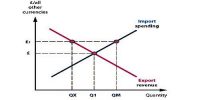Any business transaction between parties from more than one country is a part of international business. The buying and selling of goods, product or services across the national boundaries of a country are known as international business.
Factors which determine the gains from international trade with trade theory –
(a) Nature of Terms of Trade: Terms of trade, i.e. the rate at which one country’s goods exchange against those of another, tend to affect the size of gain from, trade. Terms of trade may be favorable or unfavorable to a country. A favorable term of trade implies a relatively larger share of gain to a country and an unfavorable term of trade would mean a relatively smaller share of the gain accruing to the country.
(b) The difference in Cost Ratios: According to Harrod, the gain from international trade depends on the relation between the ratios of the costs of production in the two countries concerned. The gain does not depend on the comparative cheapness of producing commodity X or Y the two countries.
It depends on the relation between the ratio of the cost of production of X to that of Y in one country and the ratio of the cost of production of X to Y in the other country. Gain is possible if the cost ratios are different in different countries.
(c) Productive efficiency of the Country: The gain international trade also depends upon the relative productive efficiency of the country. If the productive efficiency of the home country increases, it will be to the advantage of the foreign country (and vice versa), for it will lead to more favorable terms of trade for the latter. If the efficiency in producing a commodity in which a country specializes increase, its costs and price fall, and it will be advantageous to the other country. Moreover, it leads to an expansion in the volume of trade, so that the total gain from trade also increases.
(d) Relative Elasticity of Demand: The gain from international trade also depends upon the relative elasticity of demand for the commodities in different countries and the relative elasticity of supply of different commodities in different countries. When an exchange takes place as a result of specialization, the amount of the commodity that will be imported by a country depends not only on the difference in cost ratios but also on how the demand for the commodity changes.
(e) Factor Endowments and Technological Conditions: There exists a positive correlation between the size of foreign trade and the total gain reaped by the participating nations. However, kinds and quality of factors available to a country and its technological advancement have a unique significance in this regard. A big, capital-abundant, and technically as well as an economically advanced country will have a larger size of foreign trade than a small, labor-abundant, technically and economically backward country. Moreover, a country exporting manufactures will have favorable terms of trade against a country exporting primary products.













